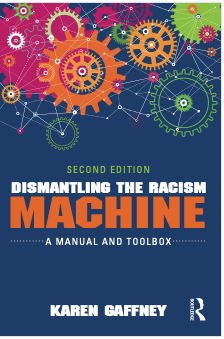Click on each chapter title below for accompanying recommended resources:

Published April 2025!
available from Routledge bookshop.org Amazon
about the book…
This significantly updated second edition serves students and general readers alike who seek to learn what is often not taught, a basic history of race and racism in the US. If we are to dismantle systemic racism and create a more just society, people need a place to begin.
This accessible, introductory, and interdisciplinary guide can be one such place. Grounded in critical race theory, this book uses the metaphor of the Racism Machine to highlight that race is a social construct and that racism is a system of oppression based on invented racial categories. It debunks the false ideologies that race is biological, that race has always existed, that systemic racism is over, and that anti‑White racism is real. As a manual, this book presents clear instructions for understanding the history of race and how a small elite created a racial hierarchy to protect their power through a divide‑and‑conquer strategy that lives on today.
As a toolbox, this book provides a variety of specific action steps that readers can take to address racism in a post‑civil rights era where extremists have weaponized the study of race and racism.
“I am obsessed with this book, a soup to nuts analysis of how and why racism operates in our minds and institutions. Loaded with terminology, talking points, research-backed data, and anecdotes, Gaffney equips readers with tools to understand and dismantle the dehumanizing machine she makes clear serves no one in the end.”
Debby Irving, author of Waking Up White, and Finding Myself in the Story of Race
“Dismantling the Racism Machine has been an invaluable teaching tool in my college courses and organizing spaces. The second edition incorporates events and policies that have occurred since it was first published and offers additional resources for self-care for those impacted by legacies of white supremacy, making it a much-needed addition to anti-racist education.”
Brandyn Heppard, PhD, Assistant Professor, Philosophy and Religious Studies, Pace University
“Perfect for a veteran or new student of structural racism, this second edition is comprehensive and includes a treasure trove of accessible, foundational information that illuminates both historical and contemporary connections. It also provides a wonderful array of suggested action steps and resources. A must read!”
Shelly Tochluk, Professor of Education at Mount Saint Mary’s University-Los Angeles, author of Witnessing Whiteness: The Journey into Racial Awareness and Antiracist Action and co-author of Being White Today: A Roadmap for a Positive Antiracist Life
“With this second edition of Dismantling the Racism Machine: A Manual and Toolbox, Gaffney has deepened and expanded her transformative work, deconstructing the interlocking political, economic, and social elements that make up the ‘racism machine.’ While the content is complex, Gaffney skillfully weaves a narrative that is both accessible and penetrating. Learners in a variety of contexts, from academic settings to community groups, will find the message compelling, and gain essential knowledge as well as the tools to work for justice.”
Lisa Richardson, Faculty Emerita, St. Catherine University
“Dismantling the Racism Machine, second edition is necessary reading for anyone hoping to gain insight on the historical, cultural and political contexts for the racism that persists in American society. Karen Gaffney’s focus on divide and conquer strategies that continue to encumber various marginalized communities pitting them against one another really sheds light on a long-standing practice that needs greater combatting. I find the move from scholarly contextualization to actual plans of taking apart this insidious machine that drives racism to be highly relevant, especially as backlash to diversity, equity and inclusion programs is growing. Karen Gaffney offers key ways readers can be engaged in the actual work of addressing racism. She covers actions such as: Support Indigenous Activism, Support Black Lives Matter, End the Racial Wealth Gap, End Mass Deportation, and so much more. The second edition of Dismantling the Racism Machine reflects Karen Gaffney’s ongoing commitment to educating the public on how they can make our society more just and free for all. I truly appreciate this book, and I am glad it is available for others to benefit from Karen Gaffney’s wisdom and work as an activist, scholar, teacher, and public thinker.”
Stacie McCormick, Associate Professor, Texas Christian University
Karen Gaffney is a Professor of English at Raritan Valley Community College in New Jersey, in the US, where she teaches courses in composition, gender, and race. She presents at national conferences, facilitates anti‑racism workshops in libraries and churches, serves in local anti‑racism coalitions, and manages the website Divided No Longer, which provides a variety of anti‑racism resources (available at dividednolonger.com).